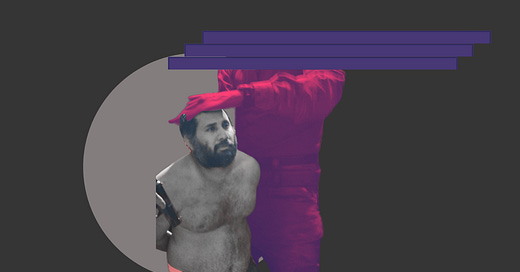🇪🇨 One captured and one on the run in Ecuador
Alias Fito captured in Ecuador, World Drug Report, El Salvador police denounce abuses, and more.
Hello!
This week, so much happened across Latin America that summarizing the news was particularly challenging.
In an event with repercussions for the entire region, on Wednesday, Ecuador's President Daniel Noboa announced the arrest of José Adolfo Macías Villamar, alias "Fito", the leader of the criminal gang Los Choneros. Fito, who had been on the run for a year and a half, was found inside a bunker in the basement of a luxury home in the city of Manta, where he was born.
He had last been seen in January 2024 when he escaped from the Guayaquil regional prison. Macías Villamar, 45, was facing 14 legal proceedings for crimes including murder, organised crime and possession of weapons, El País reported. His escape sparked a wave of violence that culminated in Noboa declaring a state of "internal armed conflict" with measures that included militarisation of the prisons and streets, as we reported in In.Visibles.
Los Choneros, the largest criminal gang operating in Ecuador, began in the 1980s as a group of hired assassins and over time evolved into a powerful organisation that dominates extortion and transnational drug trafficking, facilitated by Ecuador's strategic position on the world drug trafficking map. Ecuador now expects the United States to request Fito's extradition, EFE reported.
"Fito's capture was, without a doubt, a symbolic milestone," said Pablo Zeballos, a researcher and member of the In.Visibles network. "But the arrest of one man does not resolve a much deeper crisis: the structural weakness of Ecuador's prisons, which over time became headquarters of narco-criminal factions, strategic facilities in dispute from where killings, extortion and escapes are ordered with absolute impunity."
Zeballos has a point. Fito's capture had managed to take some of the attention away from another escape. On Friday, a few days before Fito's arrest, Federico Gómez Quintín, alias "Fede", a drug trafficker held in the Litoral penitentiary, Ecuador's most violent prison, for crimes of murder, robbery and illegal possession of weapons, escaped through the main door, dressed in military uniform, El Periódico reported.
Returning to Fito, Zeballos said there’s another aspect of this story that is key: his negotiating skills. It is believed that Fito wanted to be extradited to the United States from where, as a possible collaborator and informant for the justice system, he could manoeuvre and guarantee security for his family.
"Perhaps Fito becomes more of a problem in the United States than in Ecuador, especially because of the information he can provide for corruption investigations affecting the South American country," says Zeballos.
CAPSULES
🗒️ Record. The World Drug Report, released Thursday by the United Nations Office on Drugs and Crime, revealed a 53% increase in cocaine production in Colombia, the world's leading producer. The organisation said the increase, based on data up to 2023, reflects a global rise and is related to the expansion of Colombia's cultivation area and the concentration of higher-yielding areas. The Colombian government responded to the report with a harsh criticism of the international body, calling for an open discussion on a global drug policy focused on weakening the strongest actors in the supply chain and taking care of vulnerable sectors.
🇸🇻 Quotas. Human Rights Watch revealed that Salvadoran police reported abusive practices and arbitrary detentions in the context of the Nayib Bukele government's "war on gangs". According to the testimonies from members of the National Civil Police, the government pressured them to meet daily quotas for arrests, which were carried out without evidence or with fabricated evidence. They said that a tattoo or unverified anonymous phone calls were sufficient evidence to justify an arrest and that in some cases women were demanded sexual favours in exchange for not arresting their relatives. Since Bukele established a state of emergency in El Salvador in March 2022, security forces have reported more than 86,000 arrests, including more than 3,000 children and adolescents. Human Rights Watch's report comes in a context of increased repression of voices critical of the government, as Leire Ventas reports in this story for BBC Mundo.
🇨🇱 "The most serious". This is how the Chilean authorities described the arrest on Wednesday of six army officers accused of being part of a drug trafficking network that transported cocaine from the Bolivian border to the capital, Santiago, EFE reported. In recent years, Chile has taken on a growing role in the illicit drug supply chain, given its strategic location between producer countries and markets in Europe and Oceania.
THE FACT
48%
Percentage of murders of LGBTI+ people that occurred in Colombia, out of a total of 361 in all of Latin America in 2024, according to the most recent report by the Sin Violencia LGBTI network.
THE QUOTE
"Men came, many bandits. They started shooting. My family and I ran out of the house. As we were crossing the street, [my 19-year-old brother] was hit by a bullet. [The bullet went through his head... after that, we came to Cap-Haïtien. In my neighbourhood, there is no one left, only the bandits."
Testimony from a 23-year-old student displaced in Haiti by violence in March, to Human Rights Watch researchers one year on from the deployment of the first international security mission personnel.
ALSO
Other top reads of the week
Peru's Amazon communities accuse state of failing to curb mercury pollution from illegal mining (Steven Grattan, AP)
That’s all for now.
Thank you very much for reading and see you next week!
Josefina Salomon
Have you got any ideas or comments? Emails us: invisibles@invisibles.info










